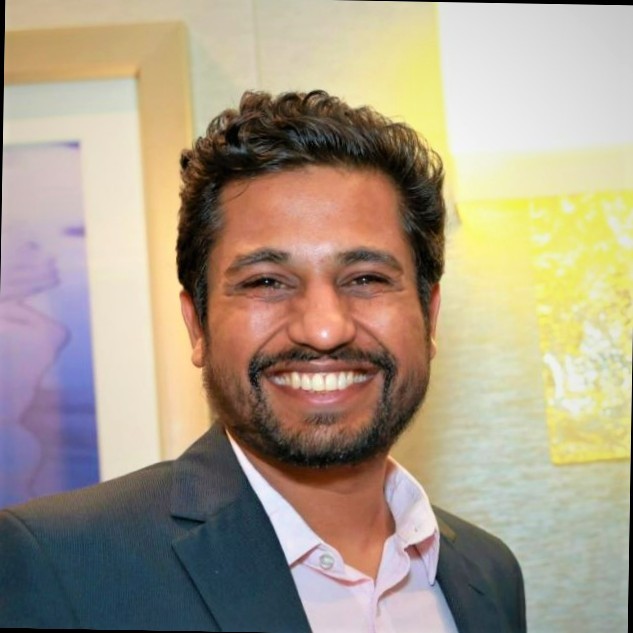
Send Inquiry

Steve Salvius
Head of Investment Banking and Private Equity

Questions for 40 under 40 Award winners for Magazine:
1. Reflecting on your career, can you share an accomplishment that stands out as particularly impactful, and how did it shape the trajectory of your professional journey?
One of the defining moments of my career was spearheading the development and growth of SG Analytics’ Investment Banking and Private Equity (IBPE) practice. This accomplishment stood out because it required a comprehensive approach to addressing market gaps while transforming how we engage with and support lower middle-market clients throughout their deal lifecycle. Leading this initiative involved creating a robust framework for research and execution and building a highly skilled team capable of delivering high-impact solutions in a competitive landscape. This milestone was a turning point for me as it emphasized the power of strategic vision and precise execution. It shaped my understanding of clients' nuanced challenges and underscored the importance of tailoring solutions to align with their unique needs. It also reinforced my belief in the value of collaboration and innovation. This experience taught me the significance of anticipating industry trends, adapting strategies to meet those shifts, and staying client focused. This accomplishment has guided my career trajectory, pushing me to seek opportunities to drive growth and create lasting impact consistently.
2. In your experience, what principles or strategies in leadership have proven most effective in steering teams and organizations toward success?
For me, effective leadership is anchored in three core principles: clear communication, empowerment, and fostering collaboration. Clear communication ensures team alignment, giving everyone a sense of purpose and direction. It involves setting clear expectations, providing constructive feedback, and creating an environment where everyone feels comfortable voicing their ideas. Conversely, empowerment is about trusting your team and encouraging them to take ownership, fostering innovation and accountability. Fostering collaboration —both within teams and across functions— is another cornerstone of successful leadership. In today’s dynamic business landscape, cross-functional teamwork is essential to adapt to rapid changes and challenges. I’ve found that building agile, cross-functional teams equipped with the right digital tools has been a game-changer. These strategies drive performance and create a workplace culture that inspires creativity and accountability. Ultimately, leadership is about guiding a team toward shared goals while nurturing a culture of trust, innovation, and adaptability.
3. How do mentorship and collaboration factor in your career, and have there been mentors or collaborators whose influence has left a lasting imprint on your professional path?
Mentorship and collaboration have been cornerstones of my professional journey. I have had the privilege of learning from mentors who underlined the importance of empathy, strategic thinking, and resilience. Their ability to combine empathy with strategic thinking helped me understand the value of building strong relationships and prioritizing long-term success over short-term gains. Collaboration, especially in investment banking, has been vital. The complexity of projects and the high stakes make trust and teamwork indispensable. My experiences working closely with clients have reinforced the importance of aligning their goals with actionable solutions. Collaborating with colleagues has also been a constant source of learning and growth, providing diverse perspectives and collective problem-solving. These relationships—built on trust and mutual respect, have left an indelible mark on my professional journey, influencing my leadership style and fostering meaningful professional connections.
4. In navigating an industry that continually evolves, what, in your view, is the key skill or mindset crucial for staying innovative and pertinent?
In an industry characterized by rapid change, cultivating adaptability and a data-driven mindset are crucial for staying innovative. The ability to continuously learn and evolve with market trends is non-negotiable. Staying ahead requires an acute awareness of emerging trends like ESG integration, digital transformation, and automation. Leveraging these trends keeps you relevant and positions you as a leader driving change in the industry. Fostering a growth mindset - being open to experimentation and fostering a culture of innovation within teams ensures agility in the face of change. Embracing challenges as opportunities for innovation allows you to stay resilient amidst uncertainty. Cultivating a growth mindset—viewing challenges as opportunities and embracing new ideas—has helped me stay relevant. Ultimately, it’s about aligning personal and organizational strategies with the broader shifts in the industry to deliver sustainable value in a constantly evolving landscape.
5. For aspiring professionals seeking recognition like yours, what advice would you offer as the most valuable lessons you've learned in your field?
For aspiring professionals, I would like to emphasize three key lessons: embrace challenges, prioritize relationships, and deliver value consistently. Above all, persistence is key. While challenges are inevitable, they are opportunities for growth and learning. Each obstacle allows you to refine your skills, expand your knowledge, and build resilience. Building trust and maintaining strong networks—whether with clients, colleagues, or mentors—can open doors to new opportunities and insights. These connections often lead to collaboration and mutual growth, which are essential in any field. Focus on delivering value. Understand your client’s needs, anticipate market trends, and tailor your approach to deliver meaningful solutions. Success isn’t just about achieving recognition; it’s about making a lasting impact through your work. Always align your efforts with a larger purpose and remember that genuine success lies in creating meaningful impact, not just personal accolades. Align your efforts with a larger purpose, and recognition will naturally follow when your contributions drive real, measurable change.

Steve Salvius
Head of Investment Banking and Private Equity

Questions for 40 under 40 Award winners for Magazine:
1. Reflecting on your career, can you share an accomplishment that stands out as particularly impactful, and how did it shape the trajectory of your professional journey?
One of the defining moments of my career was spearheading the development and growth of SG Analytics’ Investment Banking and Private Equity (IBPE) practice. This accomplishment stood out because it required a comprehensive approach to addressing market gaps while transforming how we engage with and support lower middle-market clients throughout their deal lifecycle. Leading this initiative involved creating a robust framework for research and execution and building a highly skilled team capable of delivering high-impact solutions in a competitive landscape. This milestone was a turning point for me as it emphasized the power of strategic vision and precise execution. It shaped my understanding of clients' nuanced challenges and underscored the importance of tailoring solutions to align with their unique needs. It also reinforced my belief in the value of collaboration and innovation. This experience taught me the significance of anticipating industry trends, adapting strategies to meet those shifts, and staying client focused. This accomplishment has guided my career trajectory, pushing me to seek opportunities to drive growth and create lasting impact consistently.
2. In your experience, what principles or strategies in leadership have proven most effective in steering teams and organizations toward success?
For me, effective leadership is anchored in three core principles: clear communication, empowerment, and fostering collaboration. Clear communication ensures team alignment, giving everyone a sense of purpose and direction. It involves setting clear expectations, providing constructive feedback, and creating an environment where everyone feels comfortable voicing their ideas. Conversely, empowerment is about trusting your team and encouraging them to take ownership, fostering innovation and accountability. Fostering collaboration —both within teams and across functions— is another cornerstone of successful leadership. In today’s dynamic business landscape, cross-functional teamwork is essential to adapt to rapid changes and challenges. I’ve found that building agile, cross-functional teams equipped with the right digital tools has been a game-changer. These strategies drive performance and create a workplace culture that inspires creativity and accountability. Ultimately, leadership is about guiding a team toward shared goals while nurturing a culture of trust, innovation, and adaptability.
3. How do mentorship and collaboration factor in your career, and have there been mentors or collaborators whose influence has left a lasting imprint on your professional path?
Mentorship and collaboration have been cornerstones of my professional journey. I have had the privilege of learning from mentors who underlined the importance of empathy, strategic thinking, and resilience. Their ability to combine empathy with strategic thinking helped me understand the value of building strong relationships and prioritizing long-term success over short-term gains. Collaboration, especially in investment banking, has been vital. The complexity of projects and the high stakes make trust and teamwork indispensable. My experiences working closely with clients have reinforced the importance of aligning their goals with actionable solutions. Collaborating with colleagues has also been a constant source of learning and growth, providing diverse perspectives and collective problem-solving. These relationships—built on trust and mutual respect, have left an indelible mark on my professional journey, influencing my leadership style and fostering meaningful professional connections.
4. In navigating an industry that continually evolves, what, in your view, is the key skill or mindset crucial for staying innovative and pertinent?
In an industry characterized by rapid change, cultivating adaptability and a data-driven mindset are crucial for staying innovative. The ability to continuously learn and evolve with market trends is non-negotiable. Staying ahead requires an acute awareness of emerging trends like ESG integration, digital transformation, and automation. Leveraging these trends keeps you relevant and positions you as a leader driving change in the industry. Fostering a growth mindset - being open to experimentation and fostering a culture of innovation within teams ensures agility in the face of change. Embracing challenges as opportunities for innovation allows you to stay resilient amidst uncertainty. Cultivating a growth mindset—viewing challenges as opportunities and embracing new ideas—has helped me stay relevant. Ultimately, it’s about aligning personal and organizational strategies with the broader shifts in the industry to deliver sustainable value in a constantly evolving landscape.
5. For aspiring professionals seeking recognition like yours, what advice would you offer as the most valuable lessons you've learned in your field?
For aspiring professionals, I would like to emphasize three key lessons: embrace challenges, prioritize relationships, and deliver value consistently. Above all, persistence is key. While challenges are inevitable, they are opportunities for growth and learning. Each obstacle allows you to refine your skills, expand your knowledge, and build resilience. Building trust and maintaining strong networks—whether with clients, colleagues, or mentors—can open doors to new opportunities and insights. These connections often lead to collaboration and mutual growth, which are essential in any field. Focus on delivering value. Understand your client’s needs, anticipate market trends, and tailor your approach to deliver meaningful solutions. Success isn’t just about achieving recognition; it’s about making a lasting impact through your work. Always align your efforts with a larger purpose and remember that genuine success lies in creating meaningful impact, not just personal accolades. Align your efforts with a larger purpose, and recognition will naturally follow when your contributions drive real, measurable change.